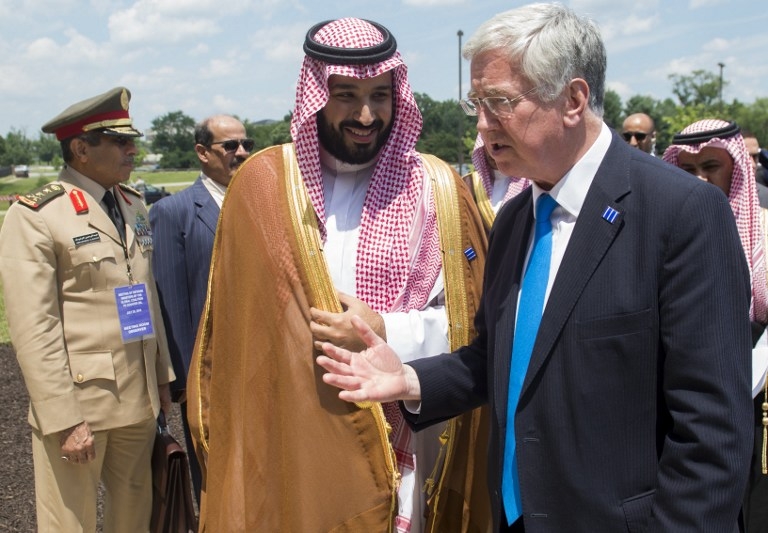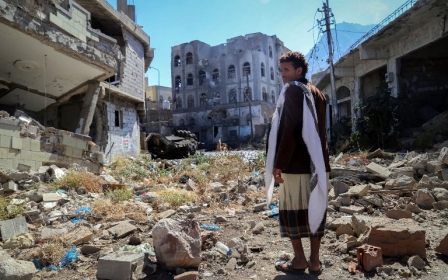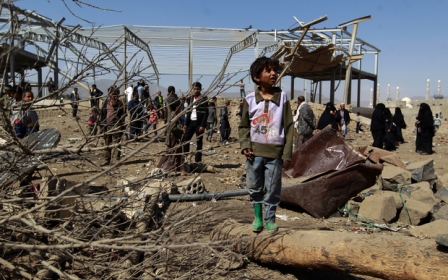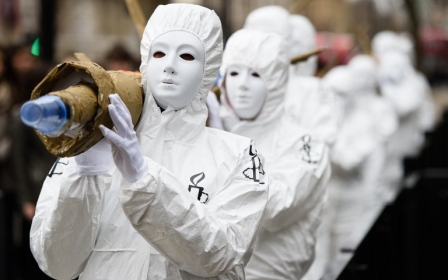UK government more concerned to protect Saudi arms deals than Yemeni lives

The phrase “national security” is regularly deployed by most governments to cover a multitude of sins. Britain’s relationship with Saudi Arabia has been no exception. Far from it.
It is now being used to cover up what Britain knew about Saudi Arabia’s bombing campaign in Yemen and how Britain has contributed to it.
Just as the media and the public were hearing tantalising evidence, they were told to leave the court to allow a case bought by the London-based Campaign Against The Arms Trade (CAAT) to be heard behind closed doors. British judges had earlier ruled that the British government had to answer claims that British weapons had been used in Yemen in breach of international humanitarian law.
At the opening of the case on Tuesday, it was revealed that the decision not to stop weapons exports to Saudi Arabia, taken by the then-business secretary Sajid Javid a year ago, was viewed as “finely balanced” by officials.
Edward Bell, head of the Export Control Organisation, wrote in an email: “my gut tells me we should suspend” the arms sales.
That was clearly enough said in public as far as the British government’s lawyers were concerned.
READ: UK government denies it ignored advice over Saudi arms sales
Halting arms sales to Saudi Arabia because of concerns they could be used to breach international law in Yemen would have “serious political ramifications”, James Eadie, a government lawyer told the court.
“One needs to be jolly careful – and it is appropriate in a friendly relationship to be jolly careful – about reaching judgments of serious violations of IHL (international humanitarian law).” Eadie went on: “If you refuse to allow exports, you interfere with the interests – if not rights – of those who wish to export their goods.”
Never mind basic human rights, the British government appeared to be arguing. Never mind the evidence that air strikes had killed civilians, including women and children, or that British cluster bombs – banned by the British government years ago because they pose a threat to innocent civilians, especially children, long after they have been dropped from aircraft – were being used against targets in Yemen.
The right to sell arms is more important. Little wonder the London court hearings, which end on Friday, went into secret session.
Special relationship
Successive British governments have nurtured a special relationship with Saudi Arabia, willing to face any amount of public – and latterly parliamentary – criticism for the sake of maintaining Britain’s most lucrative arms market.
It has attempted to counter the criticism by trying to divert attention away from weapons and arguing that Saudi Arabia is a vital ally, providing valuable intelligence to counter-terrorism.
That was the argument used by Tony Blair's government in 2005 when it ordered a halt to a Serious Fraud Office investigation into allegations of bribery surrounding the notorious Al-Yamamah (Dove in Arabic) £42bn ($53bn) oil-for arms deal agreed by Saudi Arabia and Margaret Thatcher 30 years earlier.
Saudi Arabia has been a lifeline for BAE Systems, Britain’s biggest arms company and the producer of Tornado and Typhoon aircraft used by the Saudi air force over Yemen. Britain has licensed £3.3bn ($4.1) worth of arms exports to Saudi Arabia since the Yemen offensive started in March 2015.
Last summer, the British Foreign Office retracted previous written and oral statements to parliament claiming that ministers had assessed that Saudi Arabia was not in breach of international humanitarian law in Yemen. The government had not reached a conclusion as to whether or not the Saudis were guilty of IHL violations in Yemen, it said, correcting earlier assurances, adding: “This would simply not be possible in conflicts to which the UK is not a party, as is the case in Yemen.”
READ: British-made cluster bombs used by Saudi Arabia in Yemen
Six months later, in December, Michael Fallon, the British defence secretary, admitted British cluster bombs had been used by the Saudi air force over Yemen, something he had known for about a month.
Saudi Arabia subsequently overturned earlier denials that it had used the weapons. Though an international treaty bans the use of cluster bombs, Fallon insisted international law had not been breached because they were used against “legitimate military targets”.
He made his admission to the House of Commons seemingly unaware that the US was sufficiently concerned to announce that “systematic, endemic problems in Saudi Arabia’s targeting” had persuaded it to halt future sales even of “precision-guided munitions” to the country.
CAAT accuses the British government of failing to take all precautions in bombing as required by IHL, and of failing to distinguish the targeting of civilians from military targets. It says the attacks have caused disproportionate harm to civilians and civilian objects, and that Britain has also failed to prevent the destruction of “cultural property”.
Under British arms export licensing rules, weapons would not be supplied if there was a “clear risk” they would be used to commit “serious violations of international humanitarian law”.
In a written statement, a senior Ministry of Defence official told the court: “The Saudis continue to seek to improve their processes and increase the professionalism of their armed forces and continue to be receptive to UK offers to provide training and advice”.
This is hardly a ringing endorsement of the Saudi pilots who have been bombing targets with British weapons. It would have been interesting to hear what exchanges took place in court behind closed doors on that, as well as other vital issues involving an armed conflict which threatens to escalate with even more dangerous consequences for the region.
- Richard Norton-Taylor is a former security and defence editor at the Guardian. His books include In Defence of the Realm? The case for Accountable Security and Intelligence Services, Truth is A Difficult Concept: Inside the Scott Inquiry. He has written a number of award-winning plays, including Half the Picture, The Colour of Justice, Justifying War, Bloody Sunday, which won an Olivier theatre award, Called to Account, and Chilcot. He is on the board of Liberty, the National Council for Civil Liberties. He has twice won Freedom of Information Campaign awards.
The views expressed in this article belong to the author and do not necessarily reflect the editorial policy of Middle East Eye.
Photo: Saudi Minister of Defense Deputy Crown Prince Mohammed bin Salman [L] and British Defence Secretary Michael Fallon pictured at a US military base in July 2016 (AFP)
New MEE newsletter: Jerusalem Dispatch
Sign up to get the latest insights and analysis on Israel-Palestine, alongside Turkey Unpacked and other MEE newsletters
Middle East Eye delivers independent and unrivalled coverage and analysis of the Middle East, North Africa and beyond. To learn more about republishing this content and the associated fees, please fill out this form. More about MEE can be found here.





